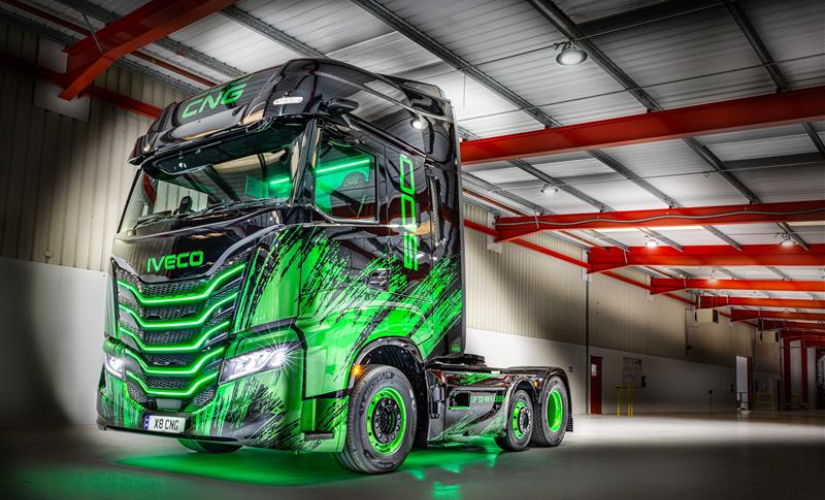The transition to cleaner energy sources in the transportation sector has been a key focus in the UK as part of its broader strategy to reduce carbon emissions and tackle air pollution. Bio Compressed Natural Gas (CNG) has emerged as a promising alternative to diesel, gaining traction among operators, particularly now more choice is available, and the refuelling infrastructure continues to improve.
Nationwide availability of Bio CNG has seen more operators adopting CNG-powered trucks their fleets driven by environmental, financial, and operational considerations.
CNG Fuels reported a record 5,528 tonnes of CNG was dispensed in July 2025, an increase of 19% from the same month last year fuelling a daily average of 2,078 vehicles refuelled at its 16 Bio-CNG stations, compared to 1,760 vehicles for the same period in 2024. It estimates that 20,000 HGVs will be using its stations daily by the end of 2028.
But even with these impressive figures the industry narrative I continue to hear on my travels around motor shows, conferences and exhibitions, is that gas is the stepping stone to the future of zero emission transport. I disagree. For me, it’s the fuel that provides a current, mid and long alternative to diesel, and it has already got a considerable head start in a number of areas.
• A nationwide re-fuelling infrastructure with continued investment
• Over 2,000 gas trucks are already on the road.
• A proven servicing and aftermarket eco system is keeping vehicles on the road.
• New 6x2 CNG trucks enable operators to run at 44 tonnes
Fuelling a CNG truck takes around six minutes compared with up to 20 minutes for hydrogen and longer still for electric, meanwhile, the validity of HVO production revealed recently by the BBC - seen by many as a cost-effective quick fix to reducing transport emissions - should also put gas in a stronger short and mid-term position.
Bio CNG produces fewer harmful emissions such as nitrogen oxides (NOx), particulate matter (PM), and carbon dioxide (CO2). For truck operators, these environmental benefits are increasingly important as UK regulators continue to tighten emissions standards and set ambitious targets for reducing the carbon footprint of transport.
While environmental considerations are important, economic factors also play a critical role in the using CNG trucks is the cost of fuel. Natural gas tends to be cheaper than diesel, and CNG is often less volatile in price, providing greater fuel cost stability for truck operators. And with 6x2 trucks capable of hauling 44-tonnes now available gas is now an even more viable option for operators.
CNG has changed from a ‘back to base’ fuel to one that is now available across the major UK trucking routes with refuelling stations ranging from Bristol to Motherwell in Scotland, and the south coast of England to Aberdeen.
Key players in the UK’s CNG refuelling infrastructure include national network providers such as CNG Fuels and Gasrec who are investing heavily in building new refuelling stations along major highways and at logistics hubs.
CNG Fuels has just announced it is close to securing investment for a further three stations and news that Gas Rec has received investment from Centrica will only help support infrastructure growth. The only missing link currently is in and around London, which may compromise fleets looking to adopt CNG vehicles in and around the M25.
Despite the numerous benefits, there are still challenges to the widespread adoption of CNG in the UK’s trucking sector. One of the main barriers is the relatively limited range of CNG trucks compared to their diesel counterparts, although those running LNG (Liquid Natural Gas) have found the comparative range to be much closer.
Another challenge is the initial cost of purchasing CNG trucks, which can be 20-25% higher than that of traditional diesel vehicles, but still much lower than comparative electric trucks. However, this upfront investment is often offset by lower running costs, longer vehicle lifespans, and the environmental benefits, making the long-term financial outlook for CNG trucks more appealing.
Looking Ahead: The Future of CNG in the UK
As the refuelling network continues to grow and technology advances, CNG will continue to play a crucial role in the decarbonisation of the UK's trucking industry with more fleet operators likely to embrace CNG as a viable alternative to diesel.
The increased availability of CNG stations and the rising demand for greener transport solutions, is likely to continue to drive the shift towards CNG.
The growing adoption of CNG is not just a short-term trend but part of a broader movement towards sustainable transport. With heavy-duty trucks being responsible for a significant share of road transport emissions, transitioning to CNG presents a meaningful opportunity for operators to reduce their environmental impact while maintaining operational efficiency.
CNG will play a key role in achieving the UK’s ambitious climate goals while helping truck operators stay competitive in a rapidly changing market.


.png)
.png)

